TEXT OF REMARKS BY DR. JOHN GRONDELSKI PRESENTED AT THE MAY 3rd CONSTITUTION DAY CELEBRATION, SUNDAY, MAY 6, AT THE ORCHARD LAKE SCHOOLS.
Most Reverend Father Chancellor,
President Bankowski
Distinguished Ladies and Gentlemen:
227 years ago, on May 3, 1791, Poland adopted its “Constitution of the Third of May.”
That’s nice, maybe even interesting. But it does not answer the question why all of you in the audience got up this morning and drove to Orchard Lake. Why did you come here America today to hear about something that happened in Poland two and a quarter centuries ago? It’s a story that sounds almost as if it should begin “a long time ago in a galaxy far, far away.”
Let me suggest that what happened a long time ago, 227 years ago, in a faraway country was not as remote as you think. I also would suggest that the effects that the Constitution of the Third of May unleashed effects still reverberate in Poland’s life, America’s life, and the lives of you and me.
First of all, let’s consider the value of a constitution. The modern world takes the notion of “constitution” for granted. I live in Washington, D.C. Among the hot spots visited by tourists is the National Archives, where they can go and look at the Constitution of the United States. Indeed, the National Archives currently features an exhibition on “Amending America,” to show how the Constitution has been changed in the 231 years since it was written.
We take the idea of a constitution for granted. The expectation that a country will have a constitution is assumed, a “box to be checked.” The world has moved past the idea that a constitution is a novelty to the point that it is an expectation. The novelty today, the exception today, is whether a country actually honors its constitution. Does the constitution really define how a government should function and protect its citizen’s rights? Or is it just window-dressing, an expected, pretty, but ultimately meaningless legal decoration? Does the constitution guarantee anything, or is it just a document packed with high-sounding platitudes, “full of sound and fury, signifying nothing?”
It may be still be novel to think that a constitution actually can do something, but even the most repressive dictatorship still thinks it has to have a constitution. Having a constitution is an ordinary expectation of the modern world.
It is worth, therefore, remembering that in 1791 that was not true.
So, as Polish Americans, the first reason the Constitution of 1791 matters is that it created a whole new expectation for the world. We are proud to be heirs of the U.S. Constitution of 1787. It is now the world’s oldest written constitution still in force. It still sets forth the principles of limited government. It still guarantees basic rights.
But we are also proud heirs of the Polish Constitution of 1791. What separates the Polish and American Constitutions is the difference between a constitution that survived and one that did not. The Polish Constitution was an example that inspired the world even if, in Poland, it remained but a dream of “what might have been.”
When Poland became the third country in the world—after the United States and France—to adopt a written constitution, the idea was considered so revolutionary, so novel, so dangerous, that the autocratic leaders of Russia, Prussia, and Austria joined together to stamp it out. The Constitution of the Third of May 1791 was one of the direct reasons why, less than four years later, Russia, Prussia, and Austria combined to partition Poland, wiping the country off the maps of the world for the next 123 years. From 1795 until 1918, the name “Poland” appeared on no map.
Poland’s erasure from the maps of Europe set into motion whole chains of events that we feel even to this day. The successful partition of Poland in 1795 brought sighs of relief from the partitioners. The democratic ideals contained in the Constitution of the Third of May—democratic government and human rights—no longer threatened the autocratic rulers of Europe.
But I invite you to engage in a thought experiment, one initially proposed by Alex Storozyński in his excellent book, The Peasant Prince: Tadeusz Kościuszko and the Age of Revolution. What if the Constitution of the Third of May had succeeded?
What if the worst dreams of the Romanovs, the Hohenzollerns, and the Hapsburgs had come true? What is Poland had succeeded in implementing a constitution that provided for limited government and expanded civil rights? How might the future have been different if Poland had succeeded?
Would Russia, Prussia, and Austria have been able to remain as autocratic as they were if there had been a democratic Poland stuck in the middle among them? Consider how isolated little West Berlin remained a beacon of hope, not just for East Germany but for the whole Soviet bloc? Could civil and human rights have remained so limited in Russia, Prussia, and Austria if there had been allowed to blossom the promise of the Constitution of the Third of May that “all power in civil society [should be] derived from the will of the people” ? And if Russia, Prussia, and Austria had been set on different courses, would there have been a World War I? A Russian Revolution? A Lenin? A Hitler?
The Constitution might have changed the lives of nations, but it didn’t. It certainly changed the lives of Polish Americans gathered here today.
The Polish American community—American Polonia—would have certainly looked different from the way it does if the Constitution of the Third of May had survived. Because the suppression of the Constitution of the Third of May, partitioned Poland in the 19th century became an area of political repression and economic impoverishment. That, in turn, led to pressure to emigrate. And those emigration pressures laid the foundations of Polonia. In short, many of us would not be here today but for what happened to Poland after the defeat of the Constitution of the Third of May.
Of course, individual Poles had come to the United States before there even was a United States. There were Poles in Jamestown. They brought with them a conviction about human equality and didn’t hesitate to launch America’s first strike, insisting that the glass they made was no less valuable because it did not come from British hands. There were Poles in the American Revolution. They also brought with them convictions about human freedom and equality. Casimir Pułaski laid down his life in the name of freedom, the only senior foreign officers to die for the American Republic. Tadeusz Kościuszko put his money where Thomas Jefferson’s mouth was, handing over the payments the U.S. Congress gave him for service in the Revolution to buy the freedom of African Americans, including—unsuccessfully—Mr. Jefferson’s.
But American Polonia was built on less prominent heroes. They were heroes more like the anonymous Poles of Jamestown than Pułaski of Savannah or Kościuszko of West Point. Between 1880 and 1920, approximately two million people came from the lands of Poland to settle in America. They came because of 19th century Poland’s political impotence and economic impoverishment, impotence and impoverishment attributable to Poland’s loss of independence after the defeat of the Constitution of the Third of May.
I call them “heroes” because, like Pułaski and Kościuszko, they helped make America great. Perhaps they didn’t built West Point like Kościuszko, but they built Detroit by making cars. Maybe they forged no chain across the Hudson like Kościuszko, but they forged steel in Gary, South Bend, and Pittsburgh. They might not have died like Pułaski at Savannah, but they were mowed down in places like Homestead, Pennsylvania. They shed their blood in West Virginia and Pennsylvania mines. They also worked the foundries of Saginaw and the auto plants of Dearborn; they sewed shirts in Jersey City and rolled cigars in Hartford; they smelted copper in Perth Amboy and shucked oysters in Baltimore; in New England, fathers and sons manned the wood and paper mills while mothers and daughters filled the textile mills. Polish immigrants farmed land the railroads abandoned as unproductive in Wisconsin and cultivated the plains of Nebraska.
And with the meager wages they earned in those places, they built Polonia, including Orchard Lake. The Orchard Lake Schools, founded in Detroit in 1885, were situated halfway between the great urban centers of Polonia on the East Coast and in Chicago, to serve the needs of God and country.
Mention of the Orchard Lake Schools should also make us recall another fact about 19th century Poland. Poland’s long burial in the 19th century taught Poles to preserve their identity, language, and culture even though they lacked a state. Poland did not exist on the map, but it existed in the heart—in the heart of every Pole who would not be assimilated, who would not surrender who he was.
We should not forget that, Russia, Prussia, and Austria not only extinguished Poland’s independence in the 18th century, but they actively sought to suppress its culture in the 19th century. All three partitioning powers adopted aggressive policies of denaturalization, their own individual Kulturkämpfe, to suppress Polish identity, language, culture, and even religion.
Here, again, immigration reinforced what Poles were learning at home. In Poland, people learned to preserve their identity without a country. Overseas, that sense of oneness grew even stronger: you might have been a Wielkopolanin, a Galician, or a Mazovian in Prussian, Austrian, or Russian Poland but, in America, you quickly discovered that you really spoke one language. You were a Pole.
And that is why Poles valued Church and education so much. The working men and women who made America great by their sweat and blood also gave their pennies, nickels, and dimes to build a magnificent parish network in America that, in its heyday, exceeded one thousand churches. Those immigrants also invested to educate their sons (and, later, daughters) by supporting the Orchard Lake Schools, convinced that their offspring would play a role in their new country as well as one day help their old country regain freedom.
And that day came in 1918, the year of Poland’s resurrection.
Although we are here to honor the Constitution of the Third of May, let us not forget that, this year, we also mark the centennial of Poland’s recovery of independence. 100 years ago, on November 11, 1918, the Poland that was wiped off Europe’s maps because of the Constitution of the Third of May returned proudly to those maps.
If we could use a time machine to travel back one hundred years, what would we have seen? American Polonia was still new and growing: immigrants were still coming, although the door would be slammed shut within five years. They were poor—the ethnic enclaves of America’s industrial cities were the “ghettoes” of the day—but the churches they built in the “Polish cathedral style,” rivaled the cathedrals of Europe. I am sure that the members of this audience would affirm that places like St. Adalbert, Sweetest Heart, Assumption, and Mount Carmel were the pride of their neighborhoods.
One hundred years ago, the Orchard Lake Schools had just moved to Orchard Lake. Although Detroit was still very Polish, Fr. Buhaczkowski had moved the “Polish Seminary” out to the “sticks” of rural Oakland County. Even when I first came as a college freshman to Orchard Lake in 1977, the Schools were still in the outer suburbs, although by that time Bloomfield Hills was far more affluent.
But in 1918, Polish Americans were saving their quarters not just to build churches but to buy war bonds, hoping that Poland’s rebirth might soon be at hand. For the previous three years, young Polonian boys crossed the Detroit River and Lake St. Claire to Canada to join Haller’s Blue Army to fight for a free Poland.
And their hopes were not illusory. Woodrow Wilson, the man who lost Polish American votes in 1912 because he did not see a need for further substandard Slavic immigrants, evolved to include, among his famous Fourteen Points proclaimed in January 1918, a call for “an independent Polish state.” By November, World War I was over and Poland once again stood among the free nations of the world.
One hundred years is not long in the life of a nation. Let us also not forget that, during those one hundred years, Poland again lost her freedom for 50 of them: from 1939-45, at the hands of German and Soviet occupation, and then from 1945-89 as a satellite of the Soviet Union. We Polish Americans should not forget that, in the 227 years since the Constitution of the Third of May, Poland has really enjoyed its freedom for only 54 years, less than the life of a man.
One hundred years later, Polonia is also changing. Many Central European ethnic communities that established themselves in the early 20th century, like the Slovaks or Hungarians, have been largely assimilated. Polonia gained an immense lease on life as a result of another tragedy: World War II. The post-World War II “political emigration” (emigracja polityczna) brought to America patriotic Poles who had fought on all fronts in World War II and refused to return to live in a communist Poland. Those immigrants revitalized the Polish American community, rebuilt its institutions and, together with the earlier immigrants and through the work of organizations like the Polish American Congress, helped achieve the dream of a free and independent Poland in annus mirabilis of 1989.
Polonia today is very different. Assimilation takes its tool. Immigration has slowed. The jobs that gave Polish Americans prosperity a century ago are gone. The vital cities of the Northeast and Midwest, to which Poles flocked a century ago, are now called the “Rust Belt.” The crown jewels of the Polish America, its churches, have been decimated: changing demographics and residual prejudices of bishops against ethnic parishes have resulted in the consolidation or closing of Polish parishes, a phenomenon very prominent here in the Archdiocese of Detroit. When I was a student here at Orchard Lake in 1977, I did a survey of the Catholic parishes that were then listed as Polish. There were about 800 of them. Today, there are probably about 150.
But we should not despair. The 123 years of Polish partition showed how creative Poles can be to preserve their culture, language, and identity. American Polonia faces challenges, but it also has untapped opportunities. Poles of the 19th century did not have tools we do today—publishing, schools, the Internet, and—yes, money—to sustain their cultural identity. I want to underscore the “money” part. If our parents, grandparents, and great-grandparents could build the great parishes they did—churches like St. Adalbert, Sweetest Heart, Assumption, Mount Carmel—on the meager wages of physical work, then we Polish Americans who have climbed the American socio-economic ladder, owe our community no less.
Finally, a few words about where we stand here in Orchard Lake.
Orchard Lake has been an essential part of the Polish American community since 1885. The dreams of Fr. Moczygemba, who founded the “Polish Seminary” and of Fr. Buhaczkowski, who moved it out here to Orchard Lake, remain: an institution to serve Church and country. The Catholic Church in the United States owes a huge debt to the many priests trained at Ss. Cyril and Methodius Seminary and St. Mary’s College. And while we often call Orchard Lake the “Polish Seminary,” there is reason to suggest that the majority of graduates from now defunct-St. Mary’s College were actually laymen who contributed to the Polish American community as educated professionals of our community. It is unfortunate that St. Mary’s College, my alma mater, no longer exists as part of the Orchard Lake Schools: Polonia needed its own college, and suffered huge losses when St. Mary’s and Alliance College in Pennsylvania closed. But Ss. Cyril and Methodius Seminary, at whose graduation I was privileged to speak yesterday, continues to serve the Church in the United States as it has for 132 years, meeting the need for Polish American priests and lay ministers. St. Mary’s Preparatory also continues to ready young people for college to become contributing members of society.
Orchard Lake today needs us. When Karol Wojtyła, the future St. John Paul II, visited Orchard Lake fifty years ago, he said clearly: “If the Orchard Lake Schools did not exist, it would be necessary to establish them.” The Pope’s plea was unambiguous: “Fill Orchard Lake to capacity; Sustain Orchard Lake; We need Orchard Lake!”
We need Orchard Lake today as much—if not more—than when Karol Wojtyła came here a half century ago. Wojtyła, himself a university professor at the Catholic University of Lublin—another institution established one hundred years ago this year to serve God and country—appreciated the importance of faith and reason in the Polish soul. The challenges Orchard Lake faces from a changed Polonia, from a Church in the United States suffering from a vocations crisis, from the costs of higher education, and even from taking these Schools for granted, are huge. Even as the Seminary brings Polish priests to the United States to serve in parishes and dioceses that do not have many, if any, Polish Americans, these Schools continue to serve God and country. They continue to do what Poles learned to do after the defeat of the Constitution of the Third of May: to sustain Polish cultural identity amidst changing, sometimes even hostile, conditions. Let us strive to be faithful to the call of St. John Paul II by redoubling our efforts to sustain institutions like the Orchard Lake Schools, so that the next century of American Polonia, amidst its challenges and opportunities, will also be bright.
So, yes, the Constitution of the Third of May matters to you and me. It matters because of its example to the world; because of what might have been had it survived; because of how its defeat shaped Poland and, by extension, American Polonia; because of its relationship to this great anniversary year of 1918; and because of how the values of freedom, faith, and the dignity of the person are shared by American Polonia and the Orchard Lake Schools. On this great anniversary, this beautiful May Sunday, let us remember and be proud of what we have accomplished not just in the past 100 but the past 227 years: “Witaj maj, Boże daj, by zbłysnął trzeci maj!”
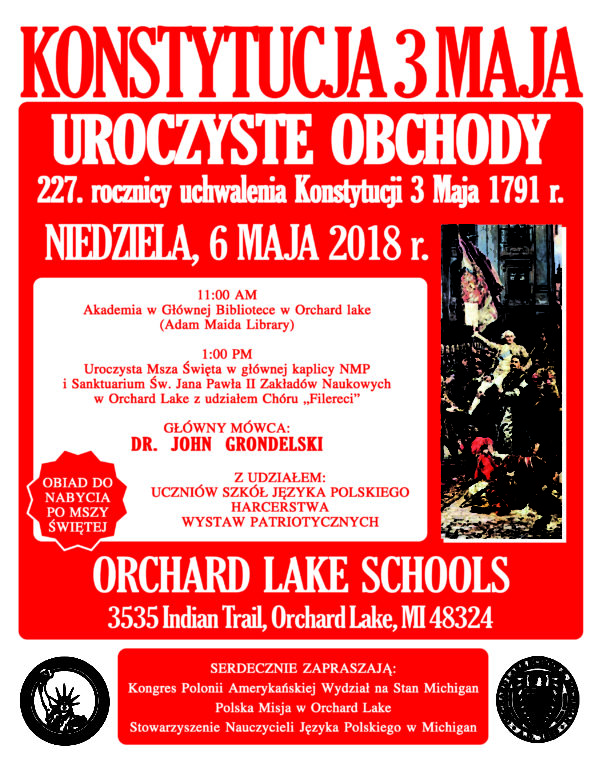
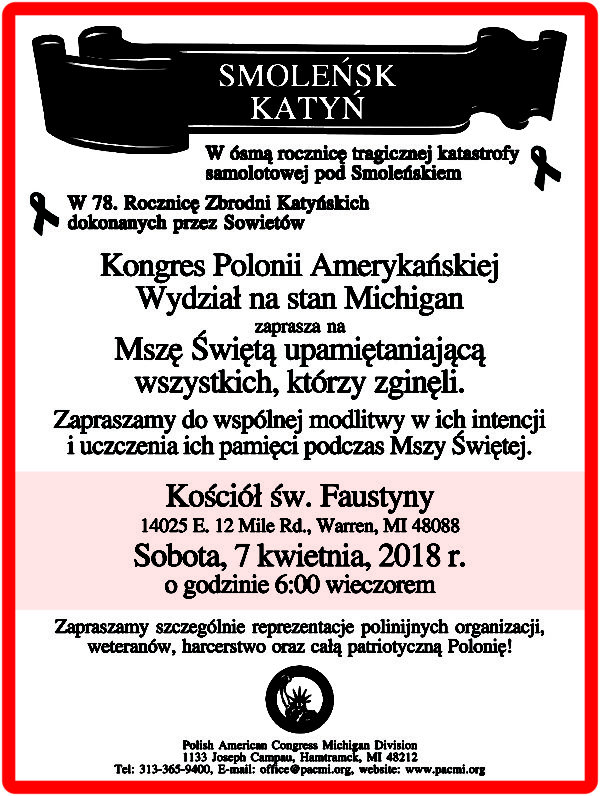
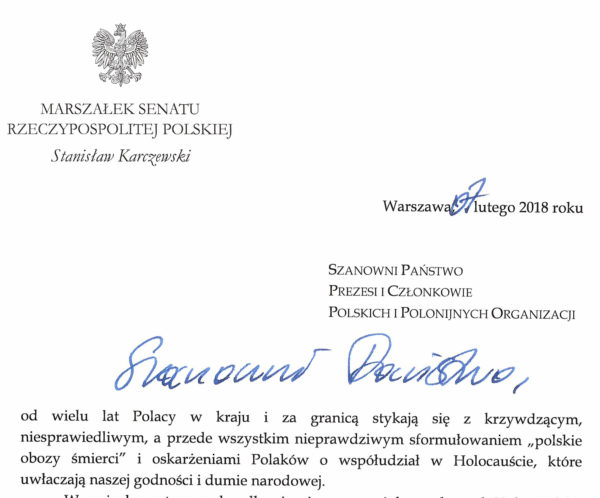
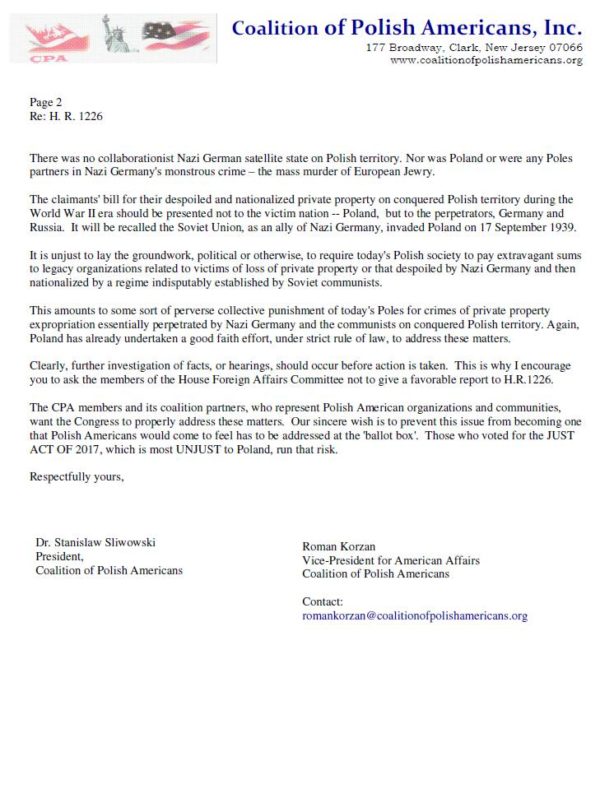
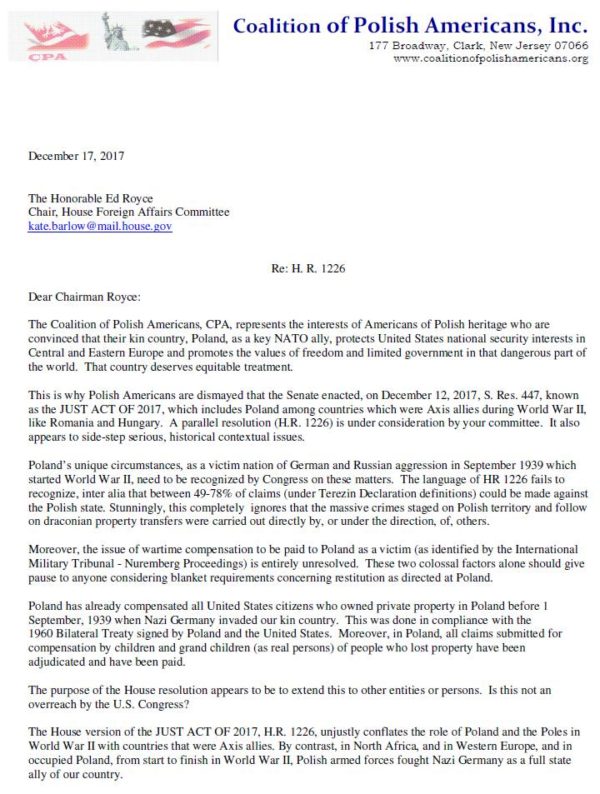





 The Polish American Congress (PAC) is a U.S. umbrella organization of Polish-Americans and Polish-American organizations. Its membership is composed of fraternal, educational, veterans, religious, cultural, social, business, and political organizations, as well as individuals.
The Polish American Congress (PAC) is a U.S. umbrella organization of Polish-Americans and Polish-American organizations. Its membership is composed of fraternal, educational, veterans, religious, cultural, social, business, and political organizations, as well as individuals.